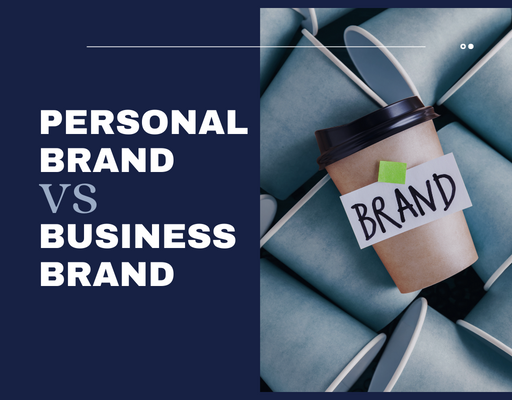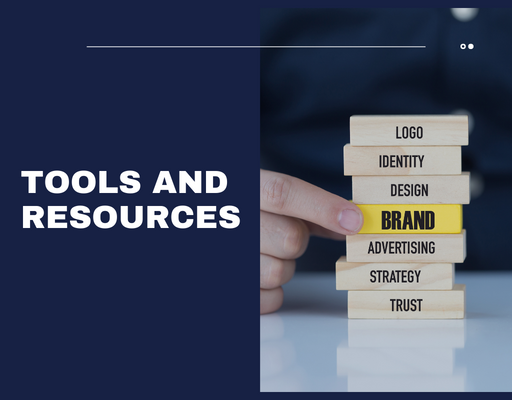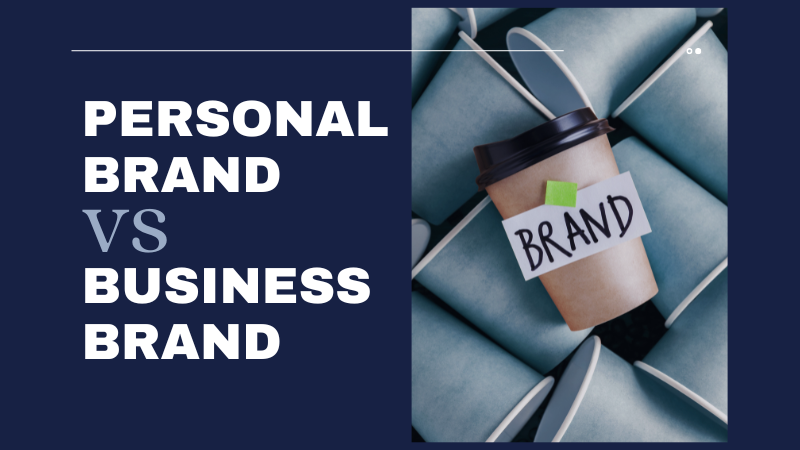As a business owner, you may have heard the terms “personal brand” and “business brand” thrown around before. But what do they really mean, and which one should you focus on building? In reality, both are crucial for the success of your business. In this article, we will explore why it’s important to build both a strong business brand and a personal brand, as well as tips and steps for building brand awareness.

Why You Need Both a Strong Business Brand and Personal Brand
First, let’s talk about what a business brand and personal brand actually are. A business brand refers to the reputation and image of your company, including its products, services, and values. A personal brand, on the other hand, refers to the reputation and image of you as an individual, including your skills, knowledge, and personality.
While it’s important to build a strong business brand so that you have an asset that you can sell in the future, it’s also important to build a personal brand so that the money you spend growing your business can transfer to you and other things you may do in the future. By building a personal brand, you establish yourself as an authority in your industry and increase your credibility with potential customers.

Another benefit of building a personal brand is that it can help you build relationships with other industry leaders and influencers. This can lead to opportunities for partnerships, collaborations, and speaking engagements.
In addition, a personal brand can help you build a loyal following of customers who are interested in your story, values, and vision. People are more likely to do business with companies that they trust, and by building a personal brand, you can establish that trust with your audience.
Tips for Building Business Brand Awareness
Now that we’ve established why it’s important to build both a strong business brand and personal brand, let’s dive into some tips for building business brand awareness.
1. Define your brand identity: Before you can start building brand awareness, you need to define your brand identity. This includes your company’s mission, values, and unique selling proposition. Once you have a clear understanding of your brand identity, you can start creating content and messaging that aligns with it.
2. Use social media: Social media is a powerful tool for building brand awareness. Make sure you have a presence on all the major social media platforms, including Facebook, Twitter, Instagram, and LinkedIn. Use these platforms to share content, engage with your audience, and promote your products and services. For example, I have business pages on Facebook and LinkedIn. (I also have public figure pages on Facebook and LinkedIn which I explain in a later section).
3. Create valuable content: In order to attract and retain customers, you need to create valuable content that resonates with them. This can include blog posts, videos, infographics, and more. Make sure your content is informative, engaging, and aligns with your brand identity.
4. Network with other businesses: Building relationships with other businesses in your industry can help you expand your reach and build brand awareness. Attend industry conferences, join networking groups, and participate in online forums to connect with other business owners and influencers.
Tips for Building Personal Brand Awareness
Now that we’ve covered some tips for building business brand awareness, let’s move on to tips for building personal brand awareness.
1. Define your personal brand: Just like with your business brand, you need to define your personal brand identity. This includes identifying your unique strengths, skills, and values. Once you have a clear understanding of your personal brand, you can start creating content and messaging that aligns with it.
2. Use social media: Social media is also a powerful tool for building personal brand awareness. Create a public figure page on Facebook or LinkedIn and use these platforms to share your expertise, engage with your audience, and showcase your personality. Use a consistent voice and messaging across all your social media platforms to establish a cohesive personal brand. For example, I have a public figure page on Facebook and LinkedIn where I share my thoughts and insights on topics related to my industry.
3. Create valuable content: Similar to building business brand awareness, creating valuable content is essential for building personal brand awareness. Write blog posts, create videos, and share articles on social media that showcase your expertise and knowledge in your industry. This will help establish you as a thought leader and increase your credibility with your audience.
4. Engage with your audience: Building a personal brand is all about building relationships with your audience. Engage with your audience on social media by responding to comments and messages, asking questions, and starting conversations. This will help you establish a personal connection with your audience and build a loyal following.
5. Leverage speaking opportunities: Speaking engagements can be a powerful way to build your personal brand and establish yourself as an authority in your industry. Look for speaking opportunities at conferences, industry events, and webinars. This will help you reach a wider audience and establish yourself as a thought leader in your industry.
Tools and Resources for Building Business and Personal Brand Awareness
Now that we’ve covered some tips for building brand awareness, let’s look at some tools and resources that can help you along the way.

- Canva: Canva is a design platform that allows you to create professional-looking graphics and marketing materials. This can be particularly useful for building brand awareness by creating visually appealing social media posts and other marketing materials. Visit https://www.canva.com/ to learn more.
- Hootsuite: Hootsuite is a social media management tool that allows you to schedule posts, monitor social media activity, and track analytics. This can be particularly useful for building brand awareness by ensuring that your social media presence is consistent and engaging. Visit https://hootsuite.com/ to learn more.
- Hubspot: Hubspot is an all-in-one marketing platform that includes tools for email marketing, social media management, lead generation, and more. This can be particularly useful for building brand awareness by providing a comprehensive set of tools to manage your marketing efforts. Visit https://www.hubspot.com/ to learn more.
In conclusion, building both a strong business brand and personal brand is essential for the success of your business. By building a strong business brand, you create an asset that has value independently of you. By building a strong personal brand, you establish yourself as an authority in your industry and increase your credibility with potential customers. Use the tips and tools we’ve discussed in this article to build your brand awareness and establish yourself as a thought leader in your industry. Remember to stay consistent, engage with your audience, and create valuable content that aligns with your brand identity.








